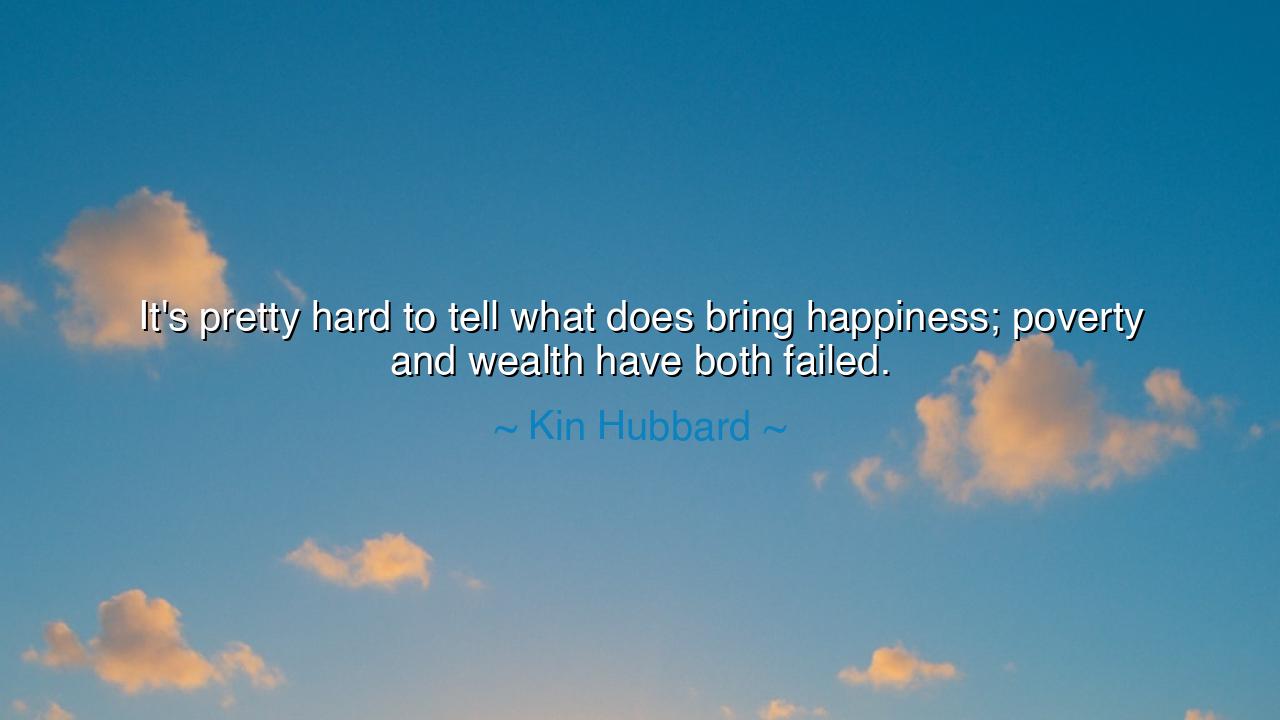
It's pretty hard to tell what does bring happiness; poverty and
It's pretty hard to tell what does bring happiness; poverty and wealth have both failed.






The words of Kin Hubbard — “It’s pretty hard to tell what does bring happiness; poverty and wealth have both failed.” — carry the tone of quiet wisdom born from observation rather than theory. With gentle humor and piercing truth, Hubbard reveals one of the oldest paradoxes of the human heart: that neither poverty nor wealth, neither want nor abundance, holds the secret to lasting happiness. He speaks not as a cynic, but as a philosopher wrapped in wit — reminding us that joy is not found in the balance of one’s gold or the size of one’s home, but in the condition of one’s spirit. His words call us to look beyond the illusions of fortune and find the source of contentment within.
Kin Hubbard, an early 20th-century American humorist, was known for his sharp insights cloaked in simplicity. Living through times of both hardship and prosperity, he saw the rich chase comfort yet lose peace, and the poor endure struggle yet retain laughter. From such contradictions, he concluded that happiness is not tied to circumstance. His humor, though often light, was edged with timeless understanding. By declaring that both poverty and wealth have failed, he stripped away humanity’s favorite excuses for discontent and pointed toward a deeper truth — that the quest for happiness is not a material pursuit, but a spiritual awakening.
In ancient times, the philosophers of both East and West reached the same realization. The Buddha, born into a palace of luxury, abandoned his riches upon seeing that wealth could not protect one from sorrow or death. He found peace not in possession, but in balance, in the middle path between indulgence and deprivation. Likewise, the Greek sage Epicurus taught that true pleasure is simple — bread, water, friendship, and the absence of fear. He warned that the pursuit of excess leads only to emptiness. Thus, through ages and cultures, wise souls have echoed Hubbard’s insight: that happiness is not bought or begged — it is cultivated in the heart.
Consider the story of Leo Tolstoy, the great Russian novelist. In his youth, he was a nobleman surrounded by privilege, wealth, and acclaim. Yet the more he achieved, the more despair consumed him. His soul, he said, was hollow. It was only when he turned away from riches and status, embracing simplicity and compassion, that he began to feel peace. “The only meaning of life,” he wrote, “is to serve humanity.” In that service, he found what wealth and fame had denied him — a happiness not dependent on circumstance, but grounded in purpose.
Hubbard’s quote also contains a subtle warning: that the human mind, forever restless, will always seek happiness in the next possession, the next goal, the next escape. The poor dream of wealth; the rich dream of rest. Both chase phantoms. For even when fortune smiles, it does not still the hunger of the heart. Without gratitude and humility, riches turn to burden. Without hope and purpose, poverty becomes despair. Thus, both extremes — poverty and wealth — fail when they are mistaken as the source of joy rather than the setting in which joy may be discovered.
To find happiness, one must turn inward, not outward. Happiness is born from alignment — when one’s actions, values, and spirit walk in harmony. It grows from gratitude for what is, rather than longing for what is not. It flourishes in relationships, in compassion, in the simple moments of daily life: a shared meal, an honest day’s work, a sunset after labor. The poor who possess love are richer than kings without peace; the rich who give generously find more contentment than those who hoard in fear. The measure of joy, then, is not in possessions, but in perspective.
So let the lesson of Kin Hubbard’s words guide us: do not tie your happiness to the fleeting tides of fortune. Seek neither misery in scarcity nor salvation in wealth. Live simply, give freely, and love deeply. Take pleasure in the work of your hands and the company of kind souls. Practice gratitude each morning, for the smallest blessings often carry the greatest joy.
And when the world tempts you with promises of wealth or whispers the despair of lack, remember: both have failed to deliver what they promise. The treasure you seek lies not in gold or grain, but in the quiet strength of a contented heart. For only there — in the still center of being — will you find what neither poverty nor wealth can ever give: the enduring light of true happiness.






AAdministratorAdministrator
Welcome, honored guests. Please leave a comment, we will respond soon